Knee Replacement Surgery in Omaha
At Nebraska Hand & Shoulder Institute, P.C., we specialize in professional knee replacement operations, offering comprehensive care to patients across Nebraska. Our experienced knee surgeons are dedicated to delivering personalized treatment plans tailored to your specific needs, ensuring optimal outcomes. We utilize the latest techniques and technology to perform both partial and total surgical knee replacements, helping patients alleviate pain and effectively regain mobility.

Is Knee Replacement Surgery Necessary?
Determining the necessity of knee replacement surgery begins with a thorough consultation. Our experts will assess your knee pain, considering factors such as severity, impact on quality of life, and response to nonsurgical treatments. While knee pain can sometimes be managed with non-steroidal anti-inflammatory medication, weight loss, or assistive devices, surgery becomes essential when these methods do not provide sufficient relief.
If you're experiencing significant discomfort or mobility issues, our team is here to guide you through the decision-making process and offer expert advice on the best course of action. Contact us for a consultation to explore if knee replacement surgery is right for you.
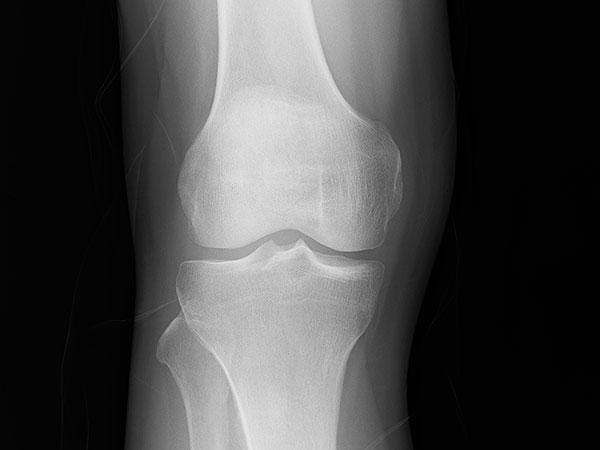
Normal Knee
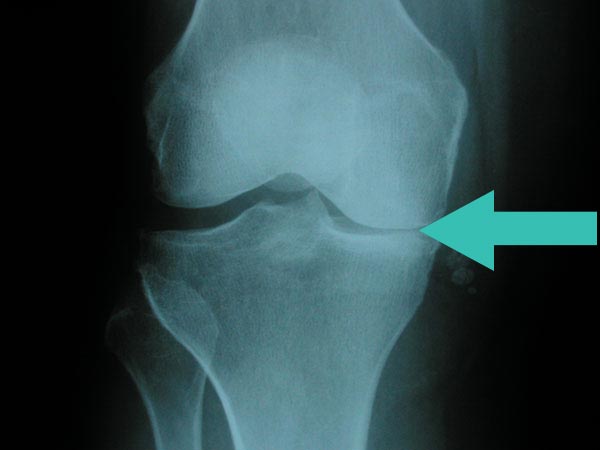
Advanced Degenerative Arthritis
of the Medial Compartment
(Note Bone-on-bone on right side)
Total Knee Replacement vs. Partial Knee Replacement
Many people believe that a complete knee replacement is the only option when they are dealing with severe knee pain. However, there are actually a number of different options available, and highly-educated surgeons are now recommending less invasive procedures when possible.
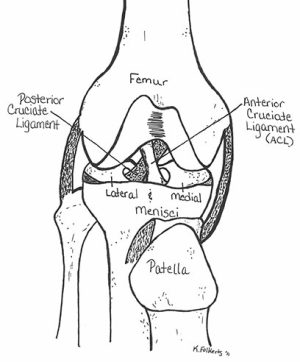
Anatomy of the Knee
What is a Partial Knee Replacement?
Studies show that keeping the native knee ligaments and resurfacing only the most involved portion of an arthritic knee may be the best option for many patients. These patients often recover faster and have better motion than those who have a total knee replacement. In fact, the satisfaction rate for patients with total knee replacement hovers around 80% while partial knee replacements have an average satisfaction rate of 90%.
One example of a partial knee replacement is changing the covering on the patella, which can help to reduce friction and pain. Another option is to change the opposing surface on the end of the thigh bone, which can help to improve the range of motion. There are also a number of different artificial joint options available, which can be customized to each individual patient. As a result, it is important to consult with a surgeon to find out what the best option is for you.
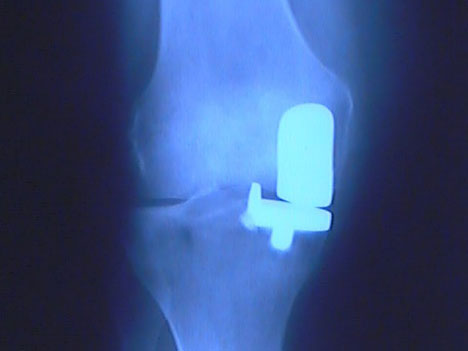
Partial Knee Replacement
Why choose Nebraska Hand & Shoulder for Your Knee Replacement Surgery
At Nebraska Hand & Shoulder Institute, we specialize in knee operations and are committed to providing the safest and most effective surgery to replace your knee joint. Our experienced team ensures optimal outcomes, prioritizing your general health and well-being.
We aim for minimally invasive procedures so that, ideally, you can return home the same day with your new artificial knee, avoiding the additional costs and risks associated with hospital stays. Choose us for your knee replacement surgery in Nebraska to experience personalized care and superior results.
Advantages of a Partial Knee Replacement
Partial knee replacements are becoming more popular due to their benefits over total knee replacements.
- The surgery is much less invasive
- Partial knee replacements cause less trauma to the surrounding tissues and muscles
- Partial knee replacement allows for tension of normal ligaments which allows a greater range of motion for the knee after surgery
- Patients can expect a quicker and easier recovery
- There is a lower risk of complications, such as blood clots, with a partial knee replacement
What is total knee arthroplasty?
Total knee arthroplasty, also referred to as knee replacement surgery, knee transplant surgery or knee change surgery, involves replacing the knee joint with an artificial implant. This implant typically consists of high-density polyethylene on one side, supported by a cobalt chrome molybdenum base, and polished chrome molybdenum on the opposite side—materials known for their strength and durability. The primary goal of the surgery is to alleviate pain and restore mobility, particularly for individuals with severe knee damage caused by osteoarthritis or rheumatoid arthritis.
The procedure is generally performed under either general or spinal anesthesia, with spinal being the most common. Under general anesthesia, you'll be asleep, while spinal anesthesia allows you to be drowsy or awake enough to converse with your anesthesiologist. During the surgery, the surgeon makes an incision in the knee, removes the damaged bone and cartilage, and secures the new implant with screws or cement.
While knee transplant surgery is typically successful, it carries some risks. Small chances of infection and blood clots exist, and the artificial joint may eventually need replacing. Therefore, I thoroughly evaluate all options before recommending surgery to my patients. In some instances, less invasive procedures like patellar kneecap resurfacing or trochleoplasty may be appropriate.
These options usually present lower complication risks and offer significant knee pain relief, especially for activities like climbing stairs. The best surgical choice depends on various factors for each patient. I ensure that I discuss all available options, allowing my patients to make well-informed decisions regarding their care.
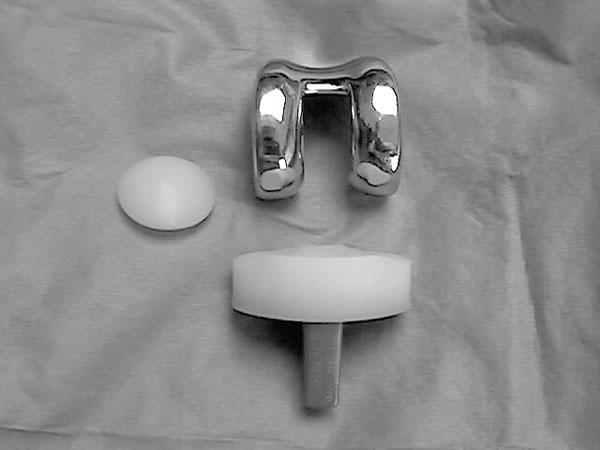
Knee Implants
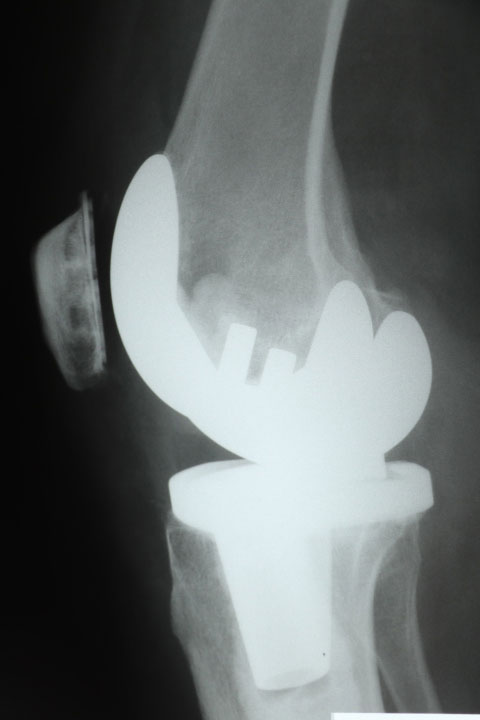
Side View of Total Knee Replacement Post Surgical
Knee replacement surgery is generally covered by insurance
Knee replacement surgery is often covered by insurance, so there is no need to worry about the cost.
If you are considering knee replacement surgery, talk to the professionals at Nebraska Hand, Shoulder, & Orthopaedics about the potential benefits and risks. Together, you can decide if knee replacement surgery is right for you.
Preparing for knee replacement surgery
Your doctor will most likely recommend that you stop smoking (if you are a smoker) for at least a month before surgery because that improves your resistance to infection and smoking has been shown to slow healing. Additionally, some doctors will not perform knee surgery until you are at an appropriate weight. It is essential that you have your house thoroughly cleaned, take a thorough shower (preferably with chlorhexidine scrub, but at a minimum, with Dial antibacterial soap) the night before surgery, and come to the facility in freshly laundered clothing. You will also need to arrange for someone to drive you home after the surgery and help you out at home for the first few days or weeks. If you have pets at home, make sure that your dog or cat is unable to get near your wound after surgery.
Benefits of knee replacement surgery
Knee pain can keep you from enjoying an active and fulfilling lifestyle. Knee replacement surgery can offer several benefits.
Improve your overall health
Knee replacement surgery can help improve your quality of life by relieving pain and restoring mobility. It can also help you return to activities and hobbies that you enjoy. The surgery is usually successful in alleviating knee pain and improving knee function.
Knee replacement surgery can also help improve your overall health. People who have knee pain often limit their physical activity, which can lead to obesity, heart disease, and other health problems. Knee replacement surgery can help you stay active and avoid these health risks.
In general, knee replacement surgery has a high success rate. As with any surgery, knee replacement surgery carries some risks and complications. These include infection, bleeding, blood clots, and knee stiffness. However, most people who have knee replacement surgery experience few, if any, complications.

Recovering from knee replacement surgery
After your surgery, you will go to a recovery room where nurses will closely monitor you. You will likely experience some pain and swelling after the surgery, but this can be controlled with medication. You will also need to use crutches or a walker for several weeks as you heal.
Most people who have knee replacement surgery experience a significant improvement in pain and function. There are, however, some risks associated with the surgery. These include infection, bleeding, blood clots, and knee stiffness.
Before having knee replacement surgery, your doctor will likely do a physical exam and order X-rays of your knee. You may also need to have your blood tested and measured in case a transfusion is necessary. Other diagnostic tests will also be performed. If you are diabetic, your serum glucose must be at an optimal level in order to reduce the risk of infection.



